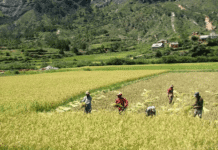African Risk Capacity (ARC) Ltd. has come on board to assist the Malawi Government with an insurance innovation that will scale up the World Bank’s Social Support for Resilient Livelihoods Project (SSRLP) in the country. This will see Malawi’s flagship safety net – the Social Cash Transfer Programme (SCTP) – reinforced with a risk transfer instrument to provide additional liquidity for the response to future droughts. It forms part of an upscaling and risk-layering approach to protect additional vulnerable households against climatic shocks and ensure earlier and rapid access to funding.
The Malawi National Local Government Finance Committee has been implementing the World Bank’s SSRLP since June 2020 to improve resilience through strengthening the national platform for safety nets. The project aims to build human capital among poor and vulnerable populations through Social Cash Transfers (SCTs), livelihoods support (LS), Enhanced Climate Smart Public Works (CSEPWP), as well as an option for scalable financing for SCTs to reach more affected households followings weather-related disasters.
Currently, the SCTP includes a mechanism to scale up the response to droughts in six districts in Malawi. The government’s long-term vision, however, is that of making it a national mechanism targeting all 28 districts, and one that responds to a wider range of climate risks and leverages more sources of financing, including donor funding. To this end, the government has made significant investments in the SCTP registration and payment systems, and institutional decision-making processes, to mitigate delays in reaching vulnerable households with cash support at the onset of
a drought.
The approach also harnesses a new insurance product specifically designed for the government to fund this scale-up, underwritten by the parametric insurer and financial affiliate of the ARC Group, ARC Ltd. It will be partly used to cover the costs of scaling up the SCTP in the 2023/24 and 2024/25 agricultural seasons, should rainfall deficits occur. This will be complemented by additional flexible contingency financing to act as a deductible to the insurance product. Funding support for this is provided by the World Bank and the Global Shield Financing Facility.
Introducing a shock-responsive mechanism
Poverty is pervasive in Malawi, with 75% of the population living below the international poverty line. The economy relies on agriculture, which accounts for more than a quarter of the GDP, and a significant percentage of the population relies on rain-fed smallholder agriculture. However, increasing natural disasters, such as cyclones, droughts, and floods, have resulted in destroyed or failed harvests and food insecurity.
“In the event of a disaster, the immediate reaction among individuals is to engage in negative coping behaviours to survive, such as selling assets like their livestock. This results in increased poverty,” explains Scalable Component Co-ordinator at the Malawi National Local Government Finance Committee, Mulder Mkutumula.
By connecting Malawi’s social protection system — the (SCTP) — to disaster risk financing instruments, the government has been able to introduce a shock-responsive mechanism that scales up the early cash-transfer response to additional vulnerable households when rainfall levels and food insecurity indicate drought conditions. “Providing the very poor households with resources before the impact of a drought is felt, helps prevent negative coping behaviours,” says Mkutumula.
Pre-defined triggers and pre-identified vulnerable households allow the government to model the potential cost of the SCTP scale-up mechanism, develop a cost-effective financing plan, and pre-arrange financing instruments. The financing plan is combined with a contingency fund for small scale-ups and the risk transfer instrument for larger scale-ups. Combining these two instruments provides the government with the financial resources required for the scale up.
“The World Bank sees Shock Responsive Social Protection mechanisms as key to ensuring that financial support quickly reaches vulnerable households after a shock. Demonstrating how this can work is a vital contribution to investments in human capital resilience, investments that are so necessary as shocks become more frequent and potentially harmful. With the support of the Global Shield – Financing Facility, the government has combined social protection delivery mechanisms with a financing plan, which the risk transfer policy is one part of. We expect to learn a lot from the mechanism being implemented in Malawi.” Practice Manager for Social Protection and Jobs for East Africa at the World Bank, Robert Chase
Application in the field
The SCTP scale-up mechanism was first implemented during the 2021/22 rainy season in the three districts of Blantyre, Ntcheu, and Thyolo. Around 74,000 households were made eligible for a cash transfer. A drought, followed by compounding shocks, resulted in an additional cash transfer for approximately 320,000 individuals totalling US$6.3 million, which the government withdrew from its contingency reserves.
For the 2022/23 season, the mechanism was expanded to cover three additional districts, namely Chiradzulu, Karonga and Nkhotakota, and reached 500 000 people (about 100 000 households) in the six districts where it was implemented.
Building on innovation with innovation
“ARC Ltd. and the Government of Malawi designed the insurance product so that it is aligned with country’s existing triggers for the SCTP scale-up mechanism. This is a ground-breaking innovation for ARC,” says Head of Business Development David Maslo. He adds that the development of insurance products for social protection is growing in Africa, fuelled by a great need. “This new product is a step in the right direction towards managing the impact of climate change in Africa so that all those impacted will be assisted. It is a model to replicate throughout the continent.”
Maslo points out that combining financial instruments and following a risk layering approach can help address the cost of the disaster response. “The structure of the policy is such that the Malawi Government retains some of the risk through their contingency fund. It also enables the triggering of the insurance product for more severe droughts and increases the overall coverage and value proposition. In this way, diverse financial instruments are used appropriately and optimised to enhance the disaster risk financing strategy of the government.
“This is also complemented by the ARC Sovereign insurance policy, which covers some of the other response costs incurred by the government in the event of a severe drought. With our deep understanding of disaster risk financing, we continue to assist our member states, such as Malawi, to diversify their DRF portfolio with a range of products that are fit for purpose. We are also delighted to simultaneously be growing our partnership with the World Bank.”
Says ARC Ltd. CEO Lesley Ndlovu: “This innovation follows shortly on the heels of our pioneering multi-year, multi-peril product designed for Djibouti, which saw us covering excess precipitation for the first time in our history. In Malawi, we have demonstrated once again the company’s inherent agility and flexibility in being able to underwrite a policy on a new product and a new set of indices,” he concludes.








